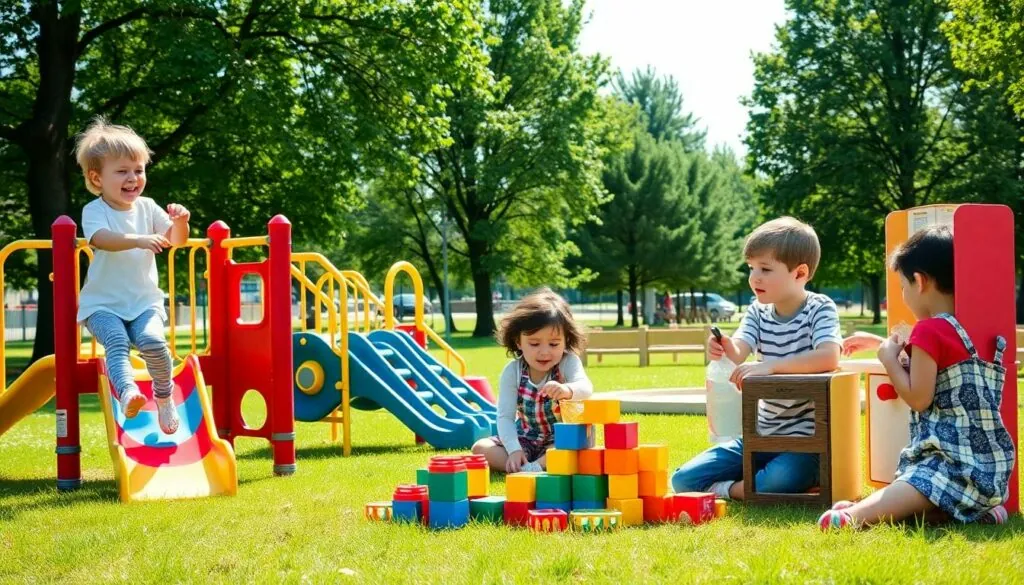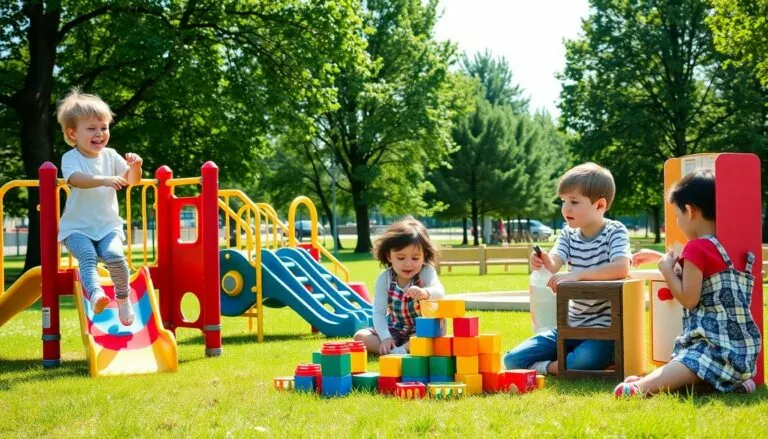Table of Contents
TogglePlay isn’t just fun and games; it’s the secret sauce for child development. From the moment a baby giggles at a silly face to the time a toddler builds a tower that rivals the Eiffel Tower, every type of play shapes who they’ll become. It’s like a magical gym where kids flex their creativity, social skills, and problem-solving muscles—all while having a blast.
Types Of Play Child Development
Play serves many purposes in child development. Each type enhances different skills essential for growth.
- Physical Play: Physical play involves activities that promote motor skills. Running, climbing, and jumping all help develop coordination and strength. Children engaging in these activities improve their fitness levels while also enjoying themselves.
- Constructive Play: This form of play encourages creativity through building and crafting. Children use blocks, Legos, or art supplies to create structures or artwork. Engaging in constructive play fosters problem-solving skills and spatial awareness.
- Symbolic Play: Symbolic play, also known as imaginative play, allows children to use their creativity to represent objects or experiences. Pretend play with dolls or role-playing as adults enhances communication skills and emotional understanding. It aids in understanding the world around them.
- Social Play: Interaction during social play is vital for developing social skills. Children learn to cooperate and take turns while playing games with peers. This type of play helps them navigate relationships and understand social norms.
- Games with Rules: Structured games introduce children to concepts of rules and fairness. They learn to follow instructions and accept winning or losing gracefully. Participating in team sports or board games builds strategic thinking and teamwork skills.
- Exploratory Play: Exploratory play encourages curiosity. Children explore their environment, touching and manipulating objects to understand how things work. This type of play enhances cognitive development and promotes investigative skills.
Engaging in these diverse types of play nurtures a child’s overall development. As children interact, create, and explore, they build the foundations for lifelong learning.
Importance Of Play In Development
Play serves a fundamental role in shaping various aspects of a child’s growth. Each type of play significantly impacts physical, cognitive, and emotional development.
Physical Development
Physical play fosters essential motor skills in children. Activities such as running, climbing, and jumping strengthen muscles and improve coordination. Engaging in play enhances overall fitness too. Balance and agility are developed as children navigate different terrains. Through physical activity, children gain confidence and learn the importance of a healthy lifestyle.
Cognitive Development
Cognitive development thrives through diverse play activities. Problem-solving skills emerge when children engage in constructive play with blocks or puzzles. Imaginative play promotes critical thinking as children create scenarios and address challenges. Exploration encourages curiosity, with children investigating their surroundings and asking questions. This active engagement forms the basis for early learning and academic success.
Social And Emotional Development
Social and emotional development flourishes through play interactions. Children learn to cooperate and take turns, which builds teamwork skills. Role-playing allows exploration of emotions, leading to better understanding of themselves and others. Engaging in games with peers teaches fairness and negotiation skills. Overall, playful interactions cultivate empathy, emotional regulation, and lasting relationships.
Different Types Of Play
Diverse types of play significantly contribute to child development. Each form serves a unique purpose, targeting various skills essential for growth.
Unstructured Play
Unstructured play involves freeform activities that allow children to explore their imagination. This type encourages creativity as they create their own rules and scenarios. Without adult direction, kids experiment with different roles and ideas. Examples include playing in a sandbox, chasing friends in the park, or simply using household items in their imaginative games. During unstructured play, children develop problem-solving abilities and self-regulation as they navigate challenges independently.
Structured Play
Structured play features organized activities with clear rules and objectives. Sports teams and board games exemplify this type, offering environments where children learn to follow guidelines. Participation requires cooperation and often promotes healthy competition. Such play builds important skills like discipline and teamwork, which are crucial for social interactions. Additionally, structured play provides opportunities for children to engage in skill development within a defined framework, enhancing cognitive growth in strategic thinking.
Cooperative Play
Cooperative play focuses on collaboration among multiple children towards a common goal. Through activities like group projects or team sports, kids learn to work together and share resources. Communication is key during cooperative play, as children must express ideas and negotiate roles. This form of play fosters social skills, including empathy and negotiation, as they encounter different perspectives. By participating in cooperative play, children strengthen their relationships and learn the value of teamwork in achieving shared objectives.
Benefits Of Each Type Of Play
Play benefits children’s development in numerous ways, helping them grow across various domains. Each type of play fosters unique skills that contribute to a child’s overall well-being.
Enhancing Creativity
Creative play allows children to explore and express their imaginations. Through artistic activities, like drawing or crafting, they generate original ideas while engaged in hands-on experiences. These activities stimulate innovative thinking, encouraging children to view problems from different angles. Role-playing scenarios enable self-expression and character exploration, nurturing an understanding of diverse perspectives. Ultimately, creative play fosters confidence in their abilities, making them more adept at expressing thoughts and emotions.
Building Social Skills
Social play cultivates vital interpersonal skills essential for healthy relationships. Engaging in group activities teaches children to work collaboratively, enhancing teamwork abilities. Through cooperative games, they learn to negotiate, share, and resolve conflicts, building empathy in the process. Interacting with peers in a social context helps them understand nonverbal cues, enabling better communication. These experiences create a foundation for nurturing friendships, which is crucial for emotional and social development.
Improving Problem-Solving Abilities
Problem-solving skills greatly benefit from constructive play. When children engage in building or crafting tasks, they encounter challenges that require critical thinking for resolution. They experiment with different approaches, fostering resilience as they learn from failures. Engaging in games with rules promotes strategic planning and decision-making. Exploration of their environment introduces discovery, prompting questions and encouraging curiosity. These experiences enhance cognitive flexibility, empowering children to tackle future challenges confidently.
Conclusion
Play is an essential component of child development that shapes a child’s overall growth. Each type of play offers unique benefits that contribute to physical, cognitive, social, and emotional skills. By engaging in various forms of play, children develop creativity, problem-solving abilities, and interpersonal skills that are crucial for their future.
Encouraging a balanced mix of unstructured and structured play allows children to explore their potential and learn through experience. As they navigate challenges and collaborate with peers, they build confidence and resilience. Prioritizing play in a child’s daily routine not only enhances development but also fosters a love for learning that lasts a lifetime.








